|
|
|
Sort Order |
|
|
|
Items / Page
|
|
|
|
|
|
|
| Srl | Item |
| 1 |
ID:
147688
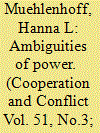

|
|
|
|
|
| Summary/Abstract |
Traditional definitions of power assume a unidirectional and coercive relationship between two actors. The debate about power in International Relations has questioned such a compulsive unidirectionality by pointing to the multidimensionality of power, as well as to the power of those who are traditionally seen at the receiving end. It is especially the latter aspect that has not been taken up seriously by empirical analyses. Moreover, research has ignored the complex power struggles the ‘receiving’ actors are engaged in and their possibility of resistance. If taken into account, these Foucauldian revisions of the concept of power allow us to analyse the development of the relationship between Turkey and the European Union (EU) since the turn of the millennium in a much more nuanced way than is often done in the existing Europeanisation literature. This case is particularly interesting, firstly because of the change in relations between the EU and Turkey, questioning the condition of a credible membership perspective under which the traditional form of power of the EU over its neighbourhood becomes effective. It secondly shows that the EU’s power extends much beyond the imposition of policy changes and has restructuring effects on society as a whole, while domestic actors are by no means passive recipients in this process.
|
|
|
|
|
|
|
|
|
|
|
|
|
|
|
|
| 2 |
ID:
179408
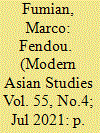

|
|
|
|
|
| Summary/Abstract |
This article analyses the modern historical trajectory of the word fendou (奋斗, ‘struggle’), from its emergence in the early twentieth century to the present. Originally embedded in a Social Darwinist philosophy of struggle, fendou was later co-opted by the Chinese Communist Party (CCP). As one of its key ideological shibboleths, it was typically used to mobilize the Chinese people to ‘struggle’ for the goals of the nation. However, as these goals varied significantly in the course of the history of the People's Republic of China (PRC), the actual meanings and uses of fendou evolved accordingly, following shifts in the ideological paradigms that characterized the different eras. By studying how this term was used as an ideological keyword over time, it is possible to observe the continuities and discontinuities in the visions of struggle, and the relevant ‘pedagogies of struggle’, promoted in different periods by the Chinese state. The article, in particular, analyses the use of fendou in both contemporary official discourse and popular culture, suggesting that in promoting the formation of a competitive subject in line with the aims of the ‘socialist market’, fendou still, at the beginning of the twenty-first century, expresses and disseminates a predominantly Social Darwinist world view.
|
|
|
|
|
|
|
|
|
|
|
|
|
|
|
|
| 3 |
ID:
159443
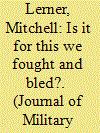

|
|
|
|
|
| Summary/Abstract |
The relationship between the Korean War and the African American civil rights movement is one that has been largely overlooked in the historical literature. This paper traces the internal struggles of the African American community during the war to examine its role in the evolution of the movement. It focuses in particular on the battlefield treatment of African American soldiers and the response of the home front to suggest that the Korean War was an important event in turning the civil rights movement towards a more confrontational position.
|
|
|
|
|
|
|
|
|
|
|
|
|
|
|
|
| 4 |
ID:
154311
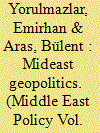

|
|
|
| 5 |
ID:
134139
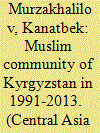

|
|
|
|
|
| Publication |
2014.
|
| Summary/Abstract |
The author analyzes the current state of affairs in the Muslim community of Kyrgyzstan and its relations with the state.
Emerging and developing amid never-ending conflict, the community has inevitably become relatively radicalized (the faithful are divided into jamaats) and, at times, destructive.
The author offers his own cures for the old and new problems of relations between the state and the Muslim community, the resolution of which is absolutely indispensable for their future development.
|
|
|
|
|
|
|
|
|
|
|
|
|
|
|
|
| 6 |
ID:
106316
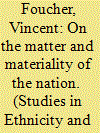

|
|
|
|
|
| Publication |
2011.
|
| Summary/Abstract |
To understand both the persistence and the very low intensity of the ongoing Casamançais separatist conflict in southern Senegal, one has to take into account the longer history of the encounter between the Senegalese state and the community that the separatists claim to represent. This is not the history of an estrangement, but quite to the contrary, a history of a strong connection, one where 'pilgrimages' of education and state employment have played a key role. It is the intensity of the connection that explains both the vivacity of the sentiment that feeds separatism and the reluctance of many Casamançais to break these links entirely. The state's success in maintaining and even revamping this connection, and the fact that many Casamançais enjoy a working relationship with Senegal and its capital city, Dakar, have been key factors. This case confirms that the materiality of experiences of nationhood matters. It also confirms the importance of education in the formation (and contestation) of nationhood.
|
|
|
|
|
|
|
|
|
|
|
|
|
|
|
|
| 7 |
ID:
040020
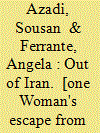

|
|
|
|
|
| Publication |
London, Macdonald and Co. (Publishers).Ltd., 1987.
|
| Description |
327p.hbk
|
| Standard Number |
0356143333
|
|
|
|
|
|
|
|
|
|
|
|
Copies: C:1/I:0,R:0,Q:0
Circulation
| Accession# | Call# | Current Location | Status | Policy | Location |
| 029408 | 955.0530924/AZA 029408 | Main | On Shelf | General | |
|
|
|
|
| 8 |
ID:
081714


|
|
|
|
|
| Publication |
2008.
|
| Summary/Abstract |
This article, written in response to recent arguments about whether or not shack dwellers can exercise historical agency, outlines the history of shack dwellers' struggles in the South African city of Durban. The sections looking at struggles under colonialism and apartheid and the nature of the post-apartheid deal with regard to housing draw on the extensive literature on these questions. The final section, which gives an outline of the emergence, nature and experience of the shack dwellers' movement, Abahlali baseMjondolo, is written from a first-hand engagement. The article concludes that in contemporary Durban organized shack dwellers are constituting a major challenge to technocratic conceptions of democracy
|
|
|
|
|
|
|
|
|
|
|
|
|
|
|
|
| 9 |
ID:
139764
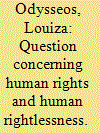

|
|
|
|
|
| Summary/Abstract |
In the midst of concerns about diminishing political support for human rights, individuals and groups across the globe continue to invoke them in their diverse struggles against oppression and injustice. Yet both those concerned with the future of human rights and those who champion rights activism as essential to resistance, assume that human rights – as law, discourse and practices of rights claiming – can ameliorate rightlessness. In questioning this assumption, this article seeks also to reconceptualise rightlessness by engaging with contemporary discussions of disposability and social abandonment in an attempt to be attentive to forms of rightlessness co-emergent with the operations of global capital. Developing a heuristic analytics of rightlessness, it evaluates the relatively recent attempts to mobilise human rights as a frame for analysis and action in the campaigns for justice following the 3 December 1984 gas leak from Union Carbide Corporation’s (UCC) pesticide manufacturing plant in Bhopal, India. Informed by the complex effects of human rights in the amelioration of rightlessness, the article calls for reconstituting human rights as an optics of rightlessness.
|
|
|
|
|
|
|
|
|
|
|
|
|
|
|
|
| 10 |
ID:
027427


|
|
|
|
|
| Publication |
Ithaca, Cornell University Press., 1981.
|
| Description |
236p.hbk
|
| Standard Number |
0801413893
|
|
|
|
|
|
|
|
|
|
|
|
Copies: C:1/I:0,R:0,Q:0
Circulation
| Accession# | Call# | Current Location | Status | Policy | Location |
| 019625 | 958.1045/NEW 019625 | Main | On Shelf | General | |
|
|
|
|
| 11 |
ID:
141052
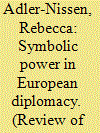

|
|
|
|
|
| Summary/Abstract |
National diplomacy is challenged by the rise of non-state actors from transnational companies to non-governmental organisations. In trying to explain these challenges, scholars tend to either focus on a specific new actor or argue that states will remain the dominant diplomatic players. This article develops an alternative Bourdieu-inspired framework addressing symbolic power. It conceptualises diplomacy in terms of a social field with agents (field incumbents and newcomers alike) who co-construct and reproduce the field by struggling for dominant positions. The framework is applied to the EU's new diplomatic service (the European External Action Service, EEAS), which is one of the most important foreign policy inventions in Europe to date. I show that the EEAS does not challenge national diplomacy in a material sense – but at a symbolic level. The EEAS questions the state's meta-capital, that is, its monopoly of symbolic power and this explains the counter-strategies adopted by national foreign services. The struggles to define the ‘genuine’ diplomat reveal a rupture in the European diplomatic field, pointing towards a transformation of European statehood and the emergence of a hybrid form of diplomacy. A focus on symbolic power opens up new avenues for the study of transformations of authority in world politics.
|
|
|
|
|
|
|
|
|
|
|
|
|
|
|
|
| 12 |
ID:
168244
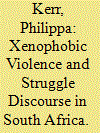

|
|
|
|
|
| Summary/Abstract |
This paper argues that xenophobia in South Africa is entangled in discourses of liberation struggle, which are often used to justify anti-foreigner violence. We first examine some existing academic explanations for xenophobia, namely internalised racism, poverty/inequality, nationalism, and township and informal settlement politics. To avoid deterministically explaining xenophobia as ‘caused’ by any of these factors, however, we introduce a concept from social psychology, the concept of ‘working models of contact’. These are common frames of reference in which contact between groups is understood in terms of shared meanings and values. Xenophobic violence is not caused but instantiated in ways that are explained and justified according to particular understandings of the meaning of the ‘citizen-foreigner’ relationship. We then review three case studies of xenophobic violence whose perpetrators constructed a model of contact in which African ‘foreigners’ were undermining the struggles of South Africans in various socio-economic contexts. We also examine three cases where xenophobic violence was actively discouraged by invoking an inclusive rather than divisive form of struggle discourse. Thus the nature of the struggle itself becomes contested. We conclude by considering some dilemmatic implications that our analysis provokes.
|
|
|
|
|
|
|
|
|
|
|
|
|
|
|
|
|
|
|
|
|